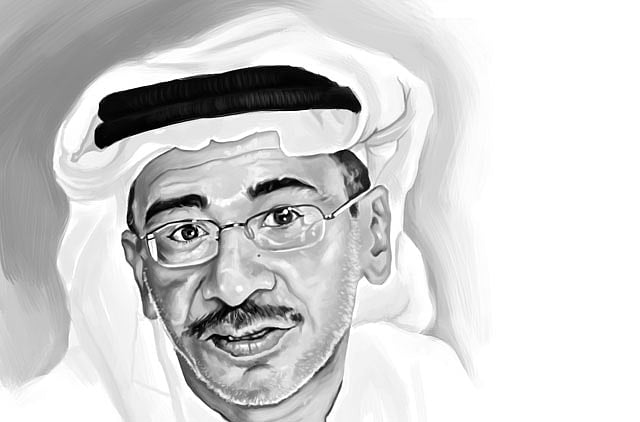The words and works of Ahmad Rashid Thani
As a poet he was the soul that immersed itself in the world of verse, constructing and deconstructing facts of life, the emotions of the self and those of the others

From the sea he came and it was near the seaside that he was laid to rest. Emirati poet, writer and researcher Ahmad Rashid Thani, who passed away recently, leaves behind a void that will be hard to fill. His life brimmed with all that brings joy and hope but it was pain that he saw towards the end.
Standing as a voice for the modern verse — Thani's poetry was born out of the salt of the sea. It was this sea that was his birthplace — a place where he would find his soul, where he pondered over life and his existence. This shore of the words was where the poet would also scribe his pains and question the fast-paced change that overtook all that existed around him.
Thani, the poet, was the soul that immersed itself in the world of verse, constructing and deconstructing the facts of life, the emotions of the self and those of the others. Yet above all, his poetry was a safe haven for the tired soul, where he would find solace and refuge. It was as if Thani was born to remain a stranger in life, whose fate was confined to that of a traveller in verse and geography — as if one reflected the other and perhaps one was the other.
And ironically this was the fate in life as much as in death as he died far away from his childhood sand, salt and sea.
"Which wave/ They describe to me the desert/ And forget the grain of sand/ In a wave that still runs by the sea/ They describe my many steps/ On the shore/ While the sea does not know/ In which wave it had drowned", he wrote.
Thani was born in Khor Fakkan in 1962, a place that will have an irreversible and unerasable imprint on all his writings and experiences. To the extent that it was as if the sea was weaving his verses, flavouring life with the taste of salt. The choice of titles and subject matter of his poems revealed this bond.
Thani's work commitments made him move between different places including Sharjah and Abu Dhabi, where he died. He started publishing poetry volumes and theatre scripts in the late 1970s. Well versed in classical Arabic as well as local Emirati colloquial, Thani produced many volumes including: Hasat Al Sabr (Rock of Patience), Yal makil khenaizi; Wa Yal kharif thahab, Juloos Alsabah Ala Al Bahar (Morning seating on the Sea), Al Salam Alaik Ayyuha Al Bahar (Greetings to you O' Sea), Ya'ti Allayl wa Ya'khuthni (Comes the Night and Takes me Away).
His suffering
In later life, Thani focused more on his research as he dedicated his time for extensive work studying the oral history of people and places in the UAE. And perhaps one of his greatest research works was on the Emirati poet of the 1800s, Ibn Daher, which was published in 1999. Thani had said that the country and the region is sitting on a treasure trove of oral history — much of which wrongly has not been documented, and which required urgent attention, exploration and safekeeping.
Yet nowhere was the writer able to bare his true soul as he did in Waraqat Al Sareer (The Bed Paper) published in 2010. The diary style of writing is a collection of impressions of his life — suffering from his heart ailment, his habits that went against acceptable social norms, travels and constant movement, and his avoidance of cultural events because of what he saw as the presence of too many intellectual dinosaurs. He also details his ordeal when his mother fell sick and had to be moved closer to where he resided in Abu Dhabi: "My mother's living in death, and I am the dead in life."
In this collection one could feel Thani's true being as he openly and freely pours out his soul — uninhibited, unrestricted and uncensored. His writing here reflects the self — the rebellious, the critical, the sarcastic, as much as the estranged soul.
From the moment he had left Khor Fakkan, Thani lived a life of estrangement, a soul that was in search of a home. This becomes very evident particularly in The Bed Paper. He describes the stark physical as much as mental metamorphoses that evolved Khor Fakkan, as well as all the places in which he lived in — so much change that he was no longer able to recognise his surroundings. Hence, it was only possible to continue life through memories which were imprinted in his heart and soul. His daily existence depended on this memory, as if it was a religion he practised or a habit he was addicted to. They were the lifeline when loneliness and the feeling of being let down was overwhelmingly conquering. "What is the age of a human's memory? Some of us claim that they remember the moment of their birth, or even before it. I am one of them and one of those who claim it."
Thani had truly lived for the written word. "My life is in writing. It gives me meaning to this world." And it is writing that will ensure he lives on. "My death becomes richer and more fruitful, like a wide eyed open garden for the butterflies of dream."
Sign up for the Daily Briefing
Get the latest news and updates straight to your inbox
Network Links
GN StoreDownload our app
© Al Nisr Publishing LLC 2025. All rights reserved.